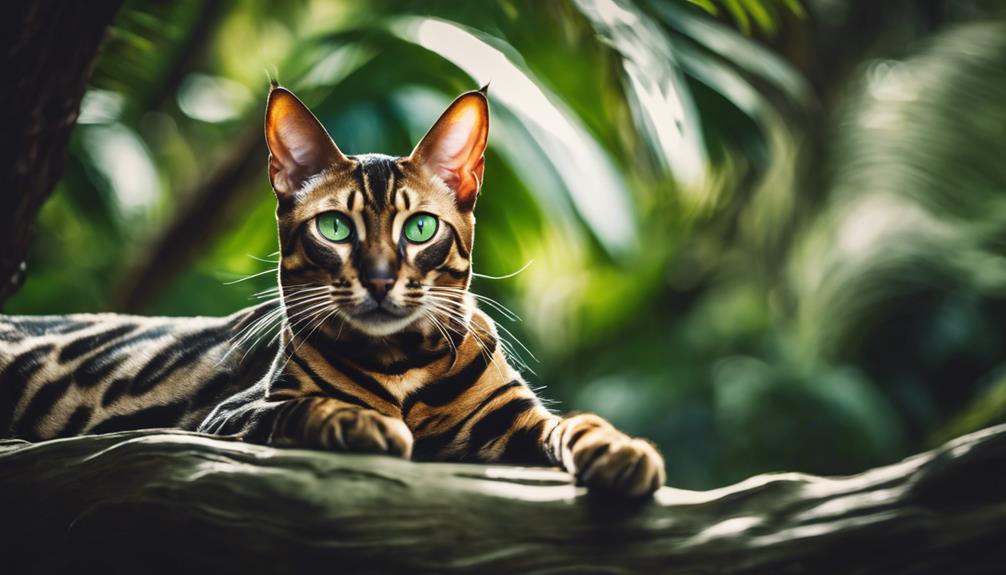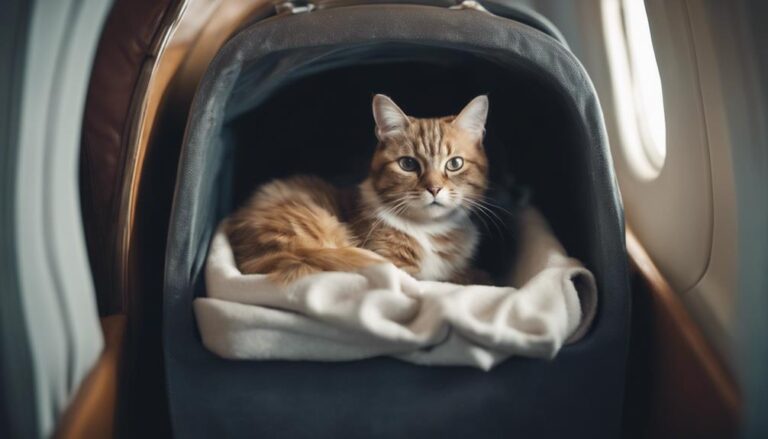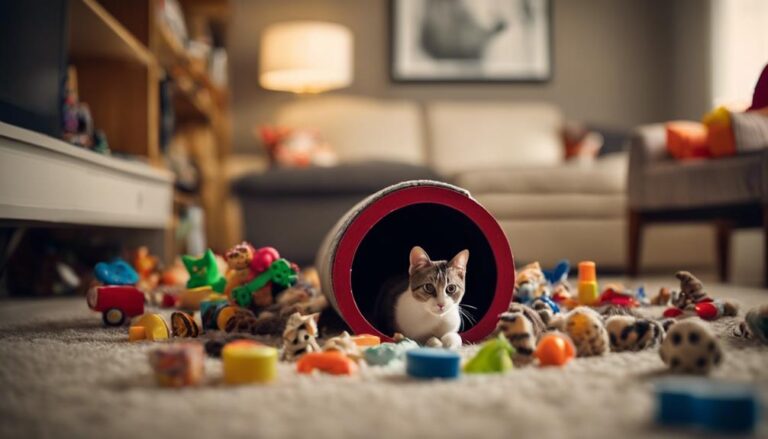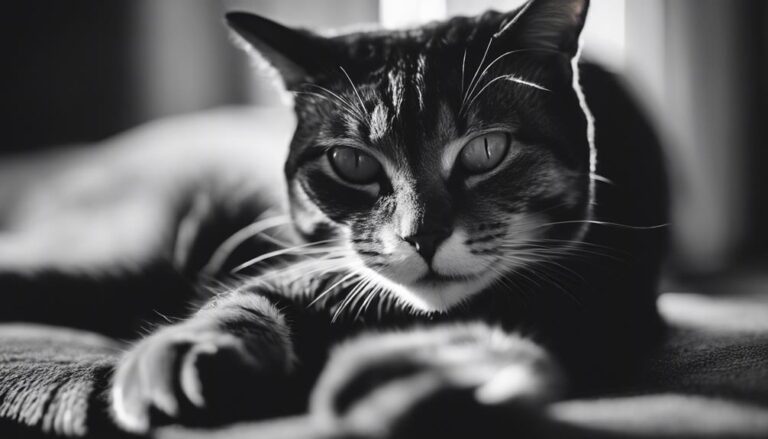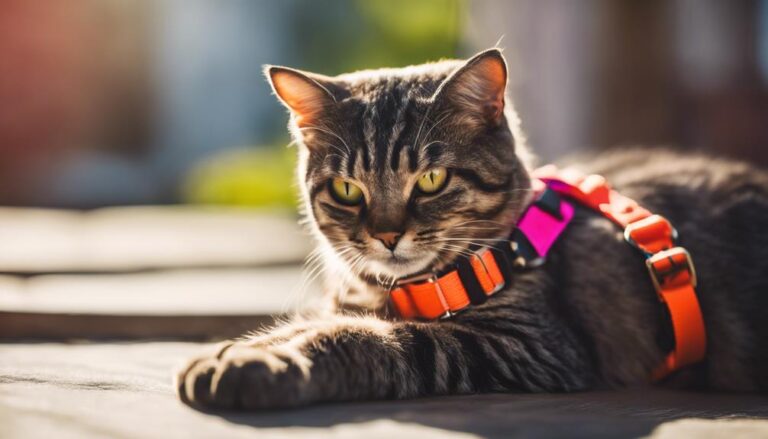So, you've heard about Bengal cats, but do you know what sets them apart from other feline breeds? Their captivating history and striking physical attributes are just the beginning. From their wild origins to their playful nature, Bengals have a lot to offer as companions. But what makes them truly unique? Stay tuned to uncover the secrets behind these mesmerizing creatures and learn how to best care for your Bengal cat.
Bengal Cat Origins and History
Bengal cats trace their origins back to a fascinating history of crossbreeding domestic cats with the Asian Leopard Cat to achieve their distinctive appearance. The breed's inception was no small feat, requiring meticulous selection and breeding to capture the wild essence in a domestic setting. Every time you gaze upon a Bengal cat, you witness the culmination of decades of careful breeding aimed at preserving the beauty and grace of their wild ancestors.
Bengals' playful and active personalities make them a joy to have around the house. They thrive on interaction and play, often enjoying climbing up a cat tree or engaging in a game of chase. Their energetic nature keeps them constantly on the move, exploring their surroundings with curiosity and agility. The history of Bengals isn't just about their looks but also about their spirited demeanor and love for play.
Distinct Physical Features of Bengals
Elegantly adorned with spotted or marbled patterns reminiscent of their wild ancestor, the Asian Leopard Cat, Bengal cats boast distinctive physical features that set them apart from conventional domestic breeds. These felines sport rounded ears, large eyes, and intense facial markings, giving them a unique and wild appearance.
Their hind legs are slightly longer than their front legs, allowing for a powerful and agile stride, reminiscent of their agile nature. Bred for a streamlined appearance akin to a racecar, Bengals exhibit physical characteristics that distinguish them from other domestic cats. With traits resembling those of wildcats, Bengal cats require mental and physical stimulation to keep them entertained and engaged.
Their striking physical attributes not only make them visually captivating but also indicate their active and playful nature, making them a dynamic addition to any household.
Bengal Cat Personality Traits
Bengal cats are playful and affectionate, making them delightful companions. Their energetic nature and curiosity often lead them to explore and engage in hunting-like behaviors.
When you welcome a Bengal into your home, be prepared to be entertained by their playful antics and to receive lots of love and attention.
Playful Nature
Renowned for their exuberant and lively demeanor, Bengal cats exhibit a playful nature that demands ample mental and physical engagement. To keep these feline companions content, interactive play is key. They thrive on activities like chasing toys, solving puzzles with feeder toys, and exploring climbing structures.
Bengals' high intelligence and curiosity drive them to seek out new challenges regularly. If you're an active individual or part of a lively family, a Bengal cat could be the perfect match for you. Their playful disposition makes them ideal for households willing to provide the necessary playtime and mental stimulation.
Create an environment rich in exploration and play, and your Bengal cat will flourish.
Affectionate Behavior
Exhibiting a warm and affectionate nature, Bengal cats form strong bonds with their owners and enjoy close companionship. These feline companions are known for their affectionate behavior, often seeking out attention and closeness with their humans.
Bengals are often described as 'velcro' cats because they enjoy being near their owners and may follow them around the house. Some Bengals even enjoy cuddling and snuggling, displaying their loving and affectionate nature.
If you're looking for a pet that will show you plenty of love and companionship, a Bengal cat might be the perfect choice for you. Their affectionate behavior makes them wonderful companions for those seeking a loving and interactive feline friend.
Understanding Bengal Cat Behavior
Understanding the behavior of Bengal cats can be enhanced by recognizing their innate wild instincts and tendencies. Due to their ancestry, Bengal cats exhibit some wild behaviors like high energy levels and a strong desire for interactive play. Positive reinforcement techniques, such as clicker training, can effectively shape and modify their behaviors.
Training your Bengal cat is crucial to redirect unwanted actions such as scratching furniture or jumping on counters. Recognizing their natural instincts, such as climbing and hunting, can help provide appropriate outlets for their energy. Socialization and mental stimulation are vital for Bengal cats to prevent boredom and potential destructive behaviors.
Caring for Your Bengal Cat
To ensure your Bengal cat stays healthy and happy, focus on providing a balanced diet, regular exercise, and proper grooming.
By making smart diet choices, engaging in playtime, and keeping your cat clean, you can help maintain their well-being.
Remember that a healthy Bengal cat is a happy Bengal cat.
Proper Diet Choices
For your Bengal cat, ensuring a diet rich in protein is essential to support their active lifestyle and maintain muscle tone. Opt for high-quality commercial cat food or a raw diet with appropriate supplements to meet their nutritional needs. Avoid feeding them a diet high in carbohydrates or fillers to prevent obesity and related health issues.
Consult with a veterinarian to determine the best diet plan based on your Bengal cat's age, weight, and activity level. Remember that proper hydration is crucial, so always provide fresh water and consider incorporating wet food into their diet to help with moisture intake. Prioritize your Bengal cat's diet to keep them healthy and thriving.
Exercise and Playtime
Ensuring your Bengal cat receives daily exercise and playtime is crucial to meeting their high energy needs and preventing boredom. Engage them with stimulating toys like puzzle feeders, interactive wands, and laser pointers to keep them mentally active. Interactive play sessions with you not only provide physical activity but also strengthen the bond between you and your Bengal cat.
Create vertical space with cat trees and shelves to satisfy their natural climbing and jumping instincts. Rotate their toys regularly and introduce new ones to prevent them from losing interest. By incorporating these activities into your Bengal cat's routine, you can help them stay healthy, happy, and mentally engaged.
Grooming and Hygiene
Maintaining your Bengal cat's grooming and hygiene is essential for their overall well-being and appearance. Since Bengal cats have an efficient self-grooming mechanism, they typically require minimal grooming from you.
However, regularly brushing their short coat can help reduce shedding and keep them looking sleek. It's important to clean their ears and trim their nails regularly to prevent any hygiene issues.
While Bengal cats are fastidious groomers and usually don't require baths unless they get exceptionally dirty, providing a clean litter box and fresh water daily is crucial for their overall hygiene.
Training Tips for Bengal Cats
When training Bengal cats, using positive reinforcement techniques like clicker training can be highly effective in shaping desired behaviors. Marilyn Krieger, a certified cat behavior consultant, advocates for this method to teach Bengal cats skills such as sitting, staying, and even shaking hands.
Remy, a Bengal cat, is currently undergoing training to deter counter surfing by redirecting his energy to a cat tree and rewarding him for using it instead. This approach not only helps in correcting unwanted behaviors but also strengthens the bond between owners and their Bengal cats.
Due to their somewhat wild nature and high energy levels, Bengal cats are recommended for experienced owners who can dedicate time and patience to their training. By implementing positive reinforcement techniques like clicker training, Bengal cat owners can effectively communicate with their feline companions and foster a harmonious relationship based on mutual understanding and respect.
Frequently Asked Questions
What Do I Need to Know About Owning a Bengal Cat?
To own a Bengal cat, be prepared for their wild nature and high energy. Train them with patience and care, provide mental stimulation, and ensure responsible breeding for their health. Their unique appearance and intelligence make them fascinating companions.
What Not to Do With Bengal Cat?
Avoid punishing harshly; use positive reinforcement. Keep small objects away; Bengals are curious. Don't leave them alone long; they crave attention. Regular vet check-ups are a must. Provide mental and physical stimulation; they're active and smart.
Do Bengals Pick One Person?
Bengals don't always pick just one person. They bond with multiple family members based on attention and care. While they may show favoritism, they enjoy interacting with everyone. Strengthen your connection through play and positive interactions.
Are Bengal Cats Hard to Handle?
Yes, Bengal cats can be hard to handle for inexperienced owners. They're energetic and need lots of mental stimulation. Interactive play, puzzle toys, and training help manage their wild side. A stimulating environment is key.

